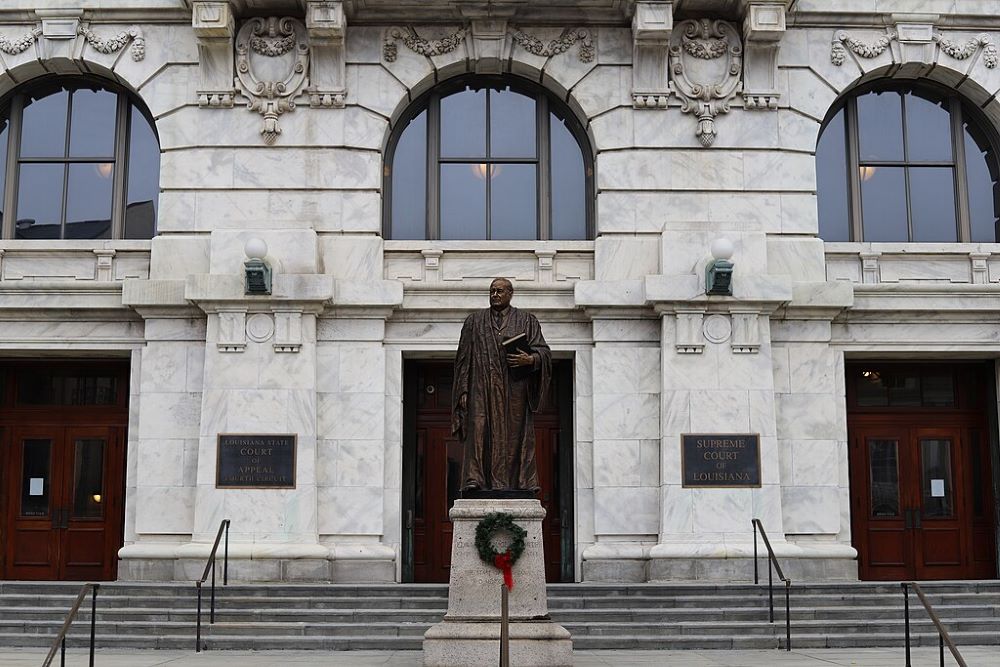
The Louisiana Supreme Court ruled 4-3 that the state's temporary suspension of the statute of limitations for child sex abuse. The main entrance to the court building in New Orleans is seen in this 2019 photo. (Wikimedia Commons/Creative Commons Attribution-Share Alike 4.0 International/Cupreous)
The Louisiana Supreme Court has ruled that the state's temporary suspension of the statute of limitations for child sex abuse is unconstitutional, a 4-3 decision likely to be seen as a win for the state's Catholic hierarchy.
The three-year "lookback window" was opened in June 2021 and allowed individuals to file abuse lawsuits regardless of when the incidents are alleged to have occurred. The change in law, stemming from a case against the Diocese of Lafayette, had faced various legal challenges and was taken up by the state’s high court in late 2023.
"We are constrained to find the statutory enactment is contrary to the due process protections enshrined in our [state] constitution and must yield to that supreme law," reads the majority opinion released on March 22.
"Accordingly, we reverse in part, and vacate in part, finding the trial court erred in overruling the exception of prescription to the extent it found the statutory enactment to be constitutional."
The decision brings to a head five years of legal friction that began with a lawsuit surrounding Msgr. Kenneth Morvant, who was accused of sexually abusing children at St. Martin of Tours Catholic Church beginning in the early 1970s. His victims sought to pursue litigation as adults in 2018 — an action the Diocese of Lafayette opposed on the grounds that the lawsuits were outside the statute of limitations, which in Louisiana is 30 years after the victim's 18th birthday.
The state legislature then unanimously passed the Louisiana Child Victims Act, which would for three years allow child sex abuse claims statewide without regard to the date the alleged crime occurred. The bill was signed into law in 2021 by then-governor John Bel Edwards, a Democrat and a Catholic. An additional revision in 2022 further enabled potential victims to sue without restrictions.
Similar laws have been enacted recently in other jurisdictions across the country, mostly with the effect of allowing a multitude of cases against Catholic clergy. These include, among others, Maryland, New York, Nevada and North Carolina. A similar law in Colorado was ruled unconstitutional in June 2023.
In August of that year, the Louisiana Third Circuit Court of Appeal upheld the Louisiana Child Victims Act as constitutional, a ruling later appealed to the state's mostly Republican supreme court by the diocese and St. Martin Church.
Advertisement
Following the court's decision to strike down the retroactive prescriptions of the Louisiana Child Victims Act, lawyers for Douglas Bienvenu — the plaintiff named in the original 2018 lawsuit — derided the decision as being against the will of the people.
"Nearly 200 elected officials [viewed] this law as being constitutional. Four elected officials just obliterated that," a statement reads.
"They cannot fathom the excruciating pain this decision has heaped upon adults who were raped as children and already suffer a life sentence."
Associate Justice William Crain, a Republican on the Louisiana Supreme Court, wrote in his dissent that voiding the lookback window will hamper efforts to hold perpetrators accountable and educate the public about child sex abuse.
"These are all legitimate government interests rationally served by revival of the prescribed claims. Due process requires nothing more," he wrote.
"Absent a constitutional violation, which defendants have not established, the forum for this debate is the legislature, not this court. The legislature had that debate and — without a single dissenting vote — abolished the procedural bar and restored plaintiffs' right to sue. I would affirm the trial court's judgment finding this legislative action constitutional."






